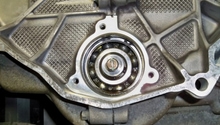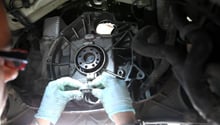Porsche 997: Are Boxer Engines Reliable Past 100,000 Miles?
Is the famed Porsche Boxer engine good past the dreaded 100,000 mile mark? Let's examine and find out.
This article applies to the Porsche 911 997 (2005-2012).
In the automotive world we tend to put cars into two mileage categories. Cars with under 100,000 miles and cars with over 100,000 miles. We do this with pretty much all cars. If we think back to the 80s and early 90s, there were cars that only had 5 digit odometers. It seems that a car's true condition is based more so on how the car was taken care of and if the maintenance was kept up with than on mileage alone. Mileage is something to take into consideration, but it is not the be all and end all of car condition.
With all that said, just how well does a Boxer engine hold up over 100,000 miles, and it is as reliable as a more conventional or more widely used engine platform? Being that the Boxer engine is horizontally opposed, this might make people even more curious as to how well it holds up over a long period. The number one thing to point out in response to this question is the fact that Porsche still uses this engine layout to this day in a number of different models in their range. So that would at least tell us that they think it's a reliable platform.
Just by looking at forum posts and poking around on the internet, when someone reports an engine failure and lists the mileage it happens at, the majority of them are under 100,000 miles. This would actually us want to declare that the Porsche Boxer engine is actually more reliable over 100,000 miles. The opinions in the consumer market are generally mixed, and keep in mind that these engines do come with their own specific issues. It comes down to just taking each car as its own unique situation. Look at the car and how well it's been taken care of and run through its maintenance history. These will be better determining factors of how reliable a car will be rather than just looking at mileage.
_–_Frontansicht,_17._April_2011,_Düsseldorf.jpg)
Common Questions
What is the most common mileage for IMS failure?
IMS failure is a potential issue in M96/M97 engines. It is still debated as to how big the percentage is of affected cars. So, the question is often asked as to when it will go out; the problem is that nobody has an answer for this because they have failed at various different mileages that are not consistent. However, it is commonly noted that M97 engines with a build date later than early 2006 do not suffer from this issue. For M96 engines, there are aftermarket bearings and solutions that can create worry-free ownership.
How much is a Porsche 997 engine to rebuild or replace?
This, of course, will vary depending on if you actually have a failure and decide to rebuild your engine or get a rebuilt or new engine and swap yours out. It would also depend on if you decide to do any upgrades or not. It's safe to say that the cost, no matter which way you would decide to go, would start at $10,000-$15,000 and go up from there.
Common Issues
IMS Failure
The biggest issue with M96/early M97 version engines is failure of the Intermediate Shaft Bearing or what is most commonly referred to as the IMS Bearing. The problem with this failure is that it is the leading cause of engine failure in these engines and requires a lot of labor to fix the issue, so cost is generally very high.
RMS Failure
The RMS or Rear Main Seal is a potential problem also although not as common. The failure of the RMS will cause an oil leak at the point where the engine meets the transmission. This is by no means a Porsche-specific issue and can (and does) happen to any vehicle.
Cylinder Cracking
The cylinders of the Boxer engine are essentially sleeves that are placed inside of the engine block. Some forum members have reported cylinder cracking and abnormal scoring of the bores, causing excessive oil consumption; however, of all the 997's produced, this has affected only a small percentage.
It's worth reminding readers that these are all worst-case scenarios with 997 ownership, and by no means does it reflect the average owner's experience. For the most part, Porsche vehicles and their engines are quite robust. The key to a happy 911 lies in regular oil changes, servicing the serpentine/accessory belt every 15-30k miles, and actually driving the cars. As Founder Ferdinand Porsche said, "Porsches are meant to be driven, not polished."
Related Discussions and Sites
- 997 Engine Reliability - Rennlist.com
- Are Porsche Boxer Engines Fragile? - Rennlist.com
- Worth Buying A High Mileage 997 − 6speedonline.com
- Porsche Maintenance Intervals -Porsche.com






